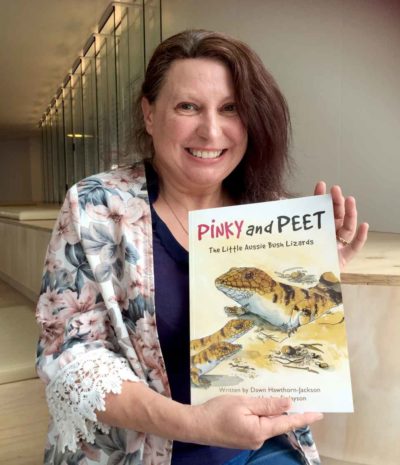
The adventures of two endangered pygmy bluetongue lizards, Pinky and Peet have been captured in a children’s book by Dawn Hawthorn-Jackson (BA ’97).
Pinky and Peet, The Little Aussie Bush Lizards was inspired by Dawn’s studies at Flinders University and her work with Professor Mike Bull, who passed away at the end of 2016.
“As an excited and nervous student I attended my first Ecology lecture and felt like I had found that thing that was missing inside of me. Mike was an excellent, passionate and humorous lecturer who believed, inspired and encouraged so many students to achieve their dreams,” said Dawn.
After graduating Dawn worked with Professor Bull as a volunteer on his lizard research projects and as an Ecology tutor at Flinders. She also worked in the field and in government organisations before launching her own business, Emu Consulting.
“I promoted Emu Consulting to Mike and was lucky enough to be contracted by him as a community engagement consultant to help raise awareness of the Pygmy Bluetongue Lizard, an endangered species unique to South Australia,” said Dawn.
This work inspired Dawn to write her first children’s book. With funding from Professor Bull, the Australian Research Council, the Murray-Darling Basin and Adelaide and Mount Lofty Ranges Natural Resource Management Boards, Dawn was able to present around 2,000 copies of the book to school libraries across South Australia.
Dawn has now created her second children’s book, The Little Aussie Bush Babies, which uses rhyme and illustrations to teach young children about some of Australia’s unique native animal species. “I thank my lucky stars that I was able to study at Flinders and receive mentoring and friendship from one of the world’s great ecological teachers. Mike believed in me and in his own unique way inspired me to believe in myself and to reach for my stars.”
The late Professor Mike Bull was the driving force behind a 35 year sleepy lizard study – the longest-running lizard survey in the southern hemisphere.

